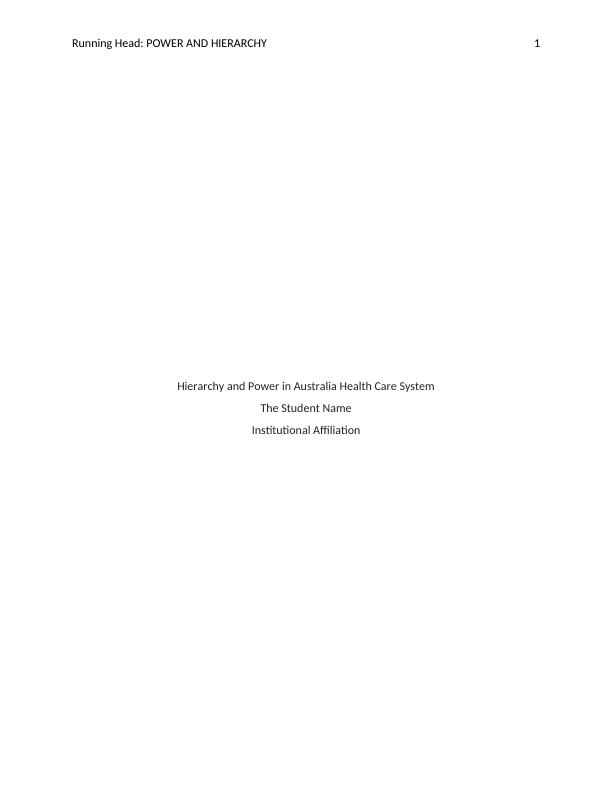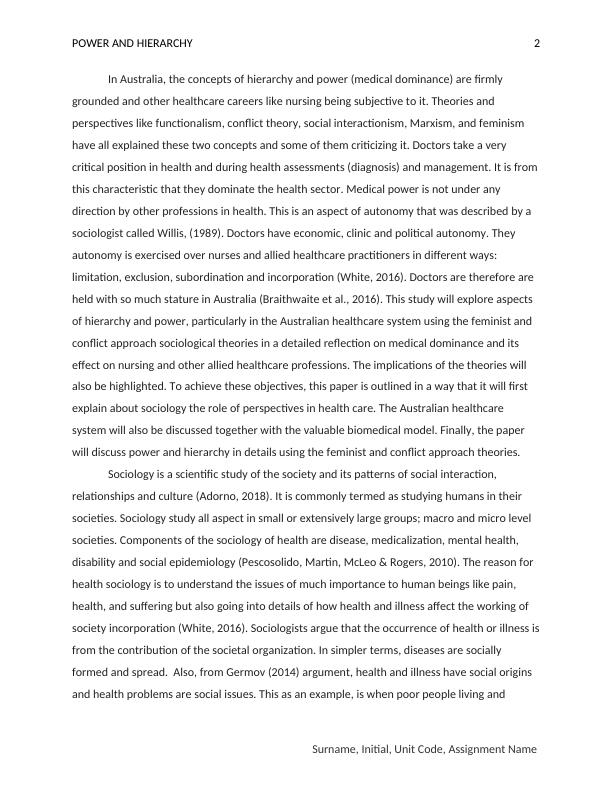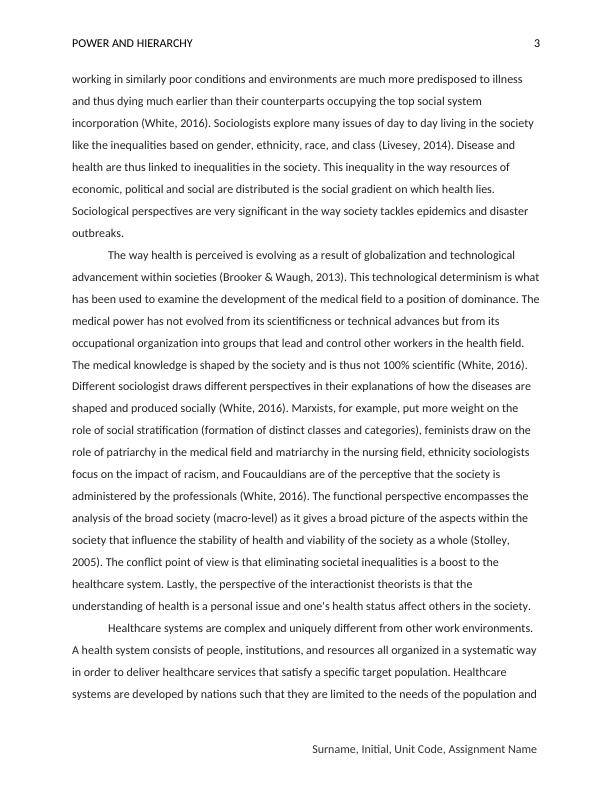Hierarchy and Power in Australia Health Care System
Added on 2023-06-03
9 Pages3350 Words462 Views
Running Head: POWER AND HIERARCHY 1
Hierarchy and Power in Australia Health Care System
The Student Name
Institutional Affiliation
Hierarchy and Power in Australia Health Care System
The Student Name
Institutional Affiliation

POWER AND HIERARCHY 2
In Australia, the concepts of hierarchy and power (medical dominance) are firmly
grounded and other healthcare careers like nursing being subjective to it. Theories and
perspectives like functionalism, conflict theory, social interactionism, Marxism, and feminism
have all explained these two concepts and some of them criticizing it. Doctors take a very
critical position in health and during health assessments (diagnosis) and management. It is from
this characteristic that they dominate the health sector. Medical power is not under any
direction by other professions in health. This is an aspect of autonomy that was described by a
sociologist called Willis, (1989). Doctors have economic, clinic and political autonomy. They
autonomy is exercised over nurses and allied healthcare practitioners in different ways:
limitation, exclusion, subordination and incorporation (White, 2016). Doctors are therefore are
held with so much stature in Australia (Braithwaite et al., 2016). This study will explore aspects
of hierarchy and power, particularly in the Australian healthcare system using the feminist and
conflict approach sociological theories in a detailed reflection on medical dominance and its
effect on nursing and other allied healthcare professions. The implications of the theories will
also be highlighted. To achieve these objectives, this paper is outlined in a way that it will first
explain about sociology the role of perspectives in health care. The Australian healthcare
system will also be discussed together with the valuable biomedical model. Finally, the paper
will discuss power and hierarchy in details using the feminist and conflict approach theories.
Sociology is a scientific study of the society and its patterns of social interaction,
relationships and culture (Adorno, 2018). It is commonly termed as studying humans in their
societies. Sociology study all aspect in small or extensively large groups; macro and micro level
societies. Components of the sociology of health are disease, medicalization, mental health,
disability and social epidemiology (Pescosolido, Martin, McLeo & Rogers, 2010). The reason for
health sociology is to understand the issues of much importance to human beings like pain,
health, and suffering but also going into details of how health and illness affect the working of
society incorporation (White, 2016). Sociologists argue that the occurrence of health or illness is
from the contribution of the societal organization. In simpler terms, diseases are socially
formed and spread. Also, from Germov (2014) argument, health and illness have social origins
and health problems are social issues. This as an example, is when poor people living and
Surname, Initial, Unit Code, Assignment Name
In Australia, the concepts of hierarchy and power (medical dominance) are firmly
grounded and other healthcare careers like nursing being subjective to it. Theories and
perspectives like functionalism, conflict theory, social interactionism, Marxism, and feminism
have all explained these two concepts and some of them criticizing it. Doctors take a very
critical position in health and during health assessments (diagnosis) and management. It is from
this characteristic that they dominate the health sector. Medical power is not under any
direction by other professions in health. This is an aspect of autonomy that was described by a
sociologist called Willis, (1989). Doctors have economic, clinic and political autonomy. They
autonomy is exercised over nurses and allied healthcare practitioners in different ways:
limitation, exclusion, subordination and incorporation (White, 2016). Doctors are therefore are
held with so much stature in Australia (Braithwaite et al., 2016). This study will explore aspects
of hierarchy and power, particularly in the Australian healthcare system using the feminist and
conflict approach sociological theories in a detailed reflection on medical dominance and its
effect on nursing and other allied healthcare professions. The implications of the theories will
also be highlighted. To achieve these objectives, this paper is outlined in a way that it will first
explain about sociology the role of perspectives in health care. The Australian healthcare
system will also be discussed together with the valuable biomedical model. Finally, the paper
will discuss power and hierarchy in details using the feminist and conflict approach theories.
Sociology is a scientific study of the society and its patterns of social interaction,
relationships and culture (Adorno, 2018). It is commonly termed as studying humans in their
societies. Sociology study all aspect in small or extensively large groups; macro and micro level
societies. Components of the sociology of health are disease, medicalization, mental health,
disability and social epidemiology (Pescosolido, Martin, McLeo & Rogers, 2010). The reason for
health sociology is to understand the issues of much importance to human beings like pain,
health, and suffering but also going into details of how health and illness affect the working of
society incorporation (White, 2016). Sociologists argue that the occurrence of health or illness is
from the contribution of the societal organization. In simpler terms, diseases are socially
formed and spread. Also, from Germov (2014) argument, health and illness have social origins
and health problems are social issues. This as an example, is when poor people living and
Surname, Initial, Unit Code, Assignment Name

POWER AND HIERARCHY 3
working in similarly poor conditions and environments are much more predisposed to illness
and thus dying much earlier than their counterparts occupying the top social system
incorporation (White, 2016). Sociologists explore many issues of day to day living in the society
like the inequalities based on gender, ethnicity, race, and class (Livesey, 2014). Disease and
health are thus linked to inequalities in the society. This inequality in the way resources of
economic, political and social are distributed is the social gradient on which health lies.
Sociological perspectives are very significant in the way society tackles epidemics and disaster
outbreaks.
The way health is perceived is evolving as a result of globalization and technological
advancement within societies (Brooker & Waugh, 2013). This technological determinism is what
has been used to examine the development of the medical field to a position of dominance. The
medical power has not evolved from its scientificness or technical advances but from its
occupational organization into groups that lead and control other workers in the health field.
The medical knowledge is shaped by the society and is thus not 100% scientific (White, 2016).
Different sociologist draws different perspectives in their explanations of how the diseases are
shaped and produced socially (White, 2016). Marxists, for example, put more weight on the
role of social stratification (formation of distinct classes and categories), feminists draw on the
role of patriarchy in the medical field and matriarchy in the nursing field, ethnicity sociologists
focus on the impact of racism, and Foucauldians are of the perceptive that the society is
administered by the professionals (White, 2016). The functional perspective encompasses the
analysis of the broad society (macro-level) as it gives a broad picture of the aspects within the
society that influence the stability of health and viability of the society as a whole (Stolley,
2005). The conflict point of view is that eliminating societal inequalities is a boost to the
healthcare system. Lastly, the perspective of the interactionist theorists is that the
understanding of health is a personal issue and one's health status affect others in the society.
Healthcare systems are complex and uniquely different from other work environments.
A health system consists of people, institutions, and resources all organized in a systematic way
in order to deliver healthcare services that satisfy a specific target population. Healthcare
systems are developed by nations such that they are limited to the needs of the population and
Surname, Initial, Unit Code, Assignment Name
working in similarly poor conditions and environments are much more predisposed to illness
and thus dying much earlier than their counterparts occupying the top social system
incorporation (White, 2016). Sociologists explore many issues of day to day living in the society
like the inequalities based on gender, ethnicity, race, and class (Livesey, 2014). Disease and
health are thus linked to inequalities in the society. This inequality in the way resources of
economic, political and social are distributed is the social gradient on which health lies.
Sociological perspectives are very significant in the way society tackles epidemics and disaster
outbreaks.
The way health is perceived is evolving as a result of globalization and technological
advancement within societies (Brooker & Waugh, 2013). This technological determinism is what
has been used to examine the development of the medical field to a position of dominance. The
medical power has not evolved from its scientificness or technical advances but from its
occupational organization into groups that lead and control other workers in the health field.
The medical knowledge is shaped by the society and is thus not 100% scientific (White, 2016).
Different sociologist draws different perspectives in their explanations of how the diseases are
shaped and produced socially (White, 2016). Marxists, for example, put more weight on the
role of social stratification (formation of distinct classes and categories), feminists draw on the
role of patriarchy in the medical field and matriarchy in the nursing field, ethnicity sociologists
focus on the impact of racism, and Foucauldians are of the perceptive that the society is
administered by the professionals (White, 2016). The functional perspective encompasses the
analysis of the broad society (macro-level) as it gives a broad picture of the aspects within the
society that influence the stability of health and viability of the society as a whole (Stolley,
2005). The conflict point of view is that eliminating societal inequalities is a boost to the
healthcare system. Lastly, the perspective of the interactionist theorists is that the
understanding of health is a personal issue and one's health status affect others in the society.
Healthcare systems are complex and uniquely different from other work environments.
A health system consists of people, institutions, and resources all organized in a systematic way
in order to deliver healthcare services that satisfy a specific target population. Healthcare
systems are developed by nations such that they are limited to the needs of the population and
Surname, Initial, Unit Code, Assignment Name

End of preview
Want to access all the pages? Upload your documents or become a member.
Related Documents
Hierarchy and Power in Australian Health Care System; Social Theorieslg...
|9
|3461
|335
Medical Power and Hierarchy in Australialg...
|10
|3143
|146
Health SOCIOLOGY INTRODUCTIONlg...
|8
|3476
|179
The Sociology of Health in Australialg...
|13
|3603
|80
Hierarchy and Power in Healthcare system Australialg...
|12
|3464
|301
NUR210 Role of Power and Hierarchy in Medical Sociologylg...
|11
|3327
|63
